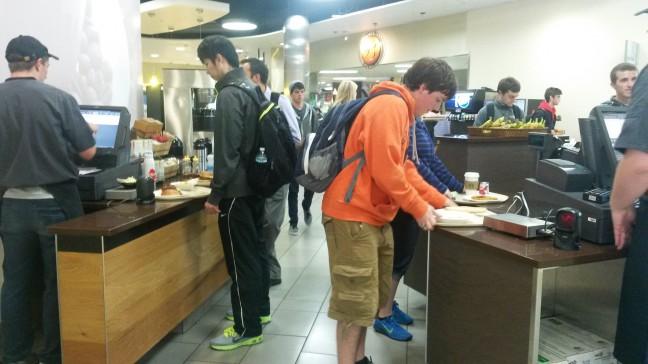In response to campaigns encouraging the University of Wisconsin to take action against student hunger and meal insecurity, one of the Flamingo Run convenience stores on campus is now accepting food stamps as a form of payment for qualifying food items.
A 2016 study found that 20 percent of students at four-year universities experience food insecurity while in college. To help those students that receive state assistance for food, UW is now accepting the Supplemental Nutrition Assistance Program benefits at the Flamingo Run in Gordon’s Dining and Event Center.
SNAP is for those who are burdened by financial difficulties and food insecurity, according to the United States Department of Agriculture’s website.
University Housing representative Brendon Dybdahl is responsible for the operation of Flamingo Run convenience stores and other food venues on campus. He believes the program will be of great importance for the university community.
“We hope that it will be a step towards a better college experience for [SNAP users], where they can get food at some of the same places as their fellow classmates,” Dybdahl said. “Programs that help normalize their college experience are valuable to our community.”
As of right now, Gordon’s Dining Hall is the only location to accept food stamps, Dybdahl said. Most of the SNAP program’s attention has been focused on getting the program off to a good start in that one venue.
Plans for expansion of the program to other convenience stores around campus are dependent upon its success at Gordon’s, Dybdahl said. He has high hopes for the future of the program.
“We have seen several SNAP transactions [at Gordon’s] since we launched two weeks ago, and we hope this grows,” Dybdahl said.
There are other difficulties besides the success rate that the SNAP program must overcome, Dybdahl said. Currently, SNAP application processes are run by the USDA and required for every location on campus that participates in the program. Guidelines of the SNAP program exclude restaurant food and hot, prepared meals which makes the dining halls ineligible for food stamp use.
While the accepting SNAP in dining halls is a newer project at UW, the university has taken other initiatives to help combat food insecurity on campus including Open Seat, Campus Kitchens and Food Recovery Network, Director of Dining & Culinary Services, Peter Testory, said. The addition of this new program is just another effort UW is making to help students in need.
“Some of our residents live a far distance from a local grocery store or other establishment that they can use their SNAP benefits,” Testory said. “By Housing offering this in these locations, it gives them a closer place to home to make their purchases.”
Testory hopes that eventually SNAP users will be able to use their benefits in the hot and prepared foods section as well. Allowing students to have a meal with their friends and feel a sense of “normality” is important to building the UW community, Testory said.
While UW doesn’t have a specific program currently in place to help those with food insecurity, it is something the university is working on because it’s an important issue, Testory said.
“I am always open to being contacted to discuss a student’s particular situation,” Testory said. “The Office of Financial Aid is also an important resource for students with financial hardships.”
Mackenzie Christman contributed to the reporting of this article.


